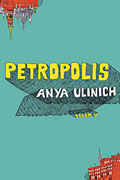
The Morning News Tournament of Books, sponsored by Powell’s Books, is an annual battle royale amongst the top novels in “literary fiction” published throughout the year. Read more about this year’s tournament »
» Buy the Books at Powells.com «
» Meet This Year’s Judges «
» Wager for Charity «
» Relive the Action: ’07, ’06, ’05 «
» Contact the Tournament Staff «
• ROUND ONE • MATCH THREE •
From the Booth
 |
Then We Came to the Endby JOSHUA FERRIS |

|
| v. | ||
Petropolisby ANYA ULINICH |
commentary by KEVIN GUILFOILE & JOHN WARNER
KEVIN: I am very happy for the success of Joshua Ferris’s comic advertising novel written in the first-person plural, because my next novel is set in a Pittsburgh ad agency and written in the second-person plural (“Y’uns are fractious and underpaid…Y’uns’s mornings lack promise.”)
I actually just started Then We Came to the End and am enjoying it a lot. As a former ad agency creative myself, I’m asked a lot if I’ll ever want to write a novel about advertising, and the answer is always no because, in spite of the old writing adage, I’ve never been interested in writing what I know. I’m more interested in writing things I’m curious about, which is why my next novel is also about a squad of Arena Football all-stars shipwrecked with an all-male nude singing revue.
But I’m glad someone else has written a great novel about advertising. I might not have any desire to spend two years writing one, but it’s a pleasure to spend a week reading one.
JOHN: I want to warn you that I feel a lengthy response coming on, so brace yourself.
It strikes me that Then We Came to the End is one of those books that embodies a particular model for the book industry. A fresh voice, great cover, engaging and likable author, strong PR push, award nominations, and now victories have added up to some serious upwardly mobile mojo for Joshua Ferris, whose next novel isn’t even done and has already had the film rights snapped up by Scott Rudin. As a general believer in and cheerleader for books, I’m thrilled every time this sort of thing happens. I’d be more thrilled if it happened to me, but what are you going to do?
This year’s Then We Came to the End appears to be Charles Bock’s Beautiful Children, which has come on to the scene to strong reviews and lengthy author profiles. This time next year we’ll know if it also earns some prizes. Like Then We Came to the End, Beautiful Children’s author has a biography that informs and grounds the book, the interesting back-story that apparently confers some sort of additional authenticity on the quality of the work.
The previous year’s Then We Came to the End was Marisha Pessl’s Special Topics in Calamity Physics. I imagine there was an example the year before that, but as I get older I lose the ability to hold information in my head. That nugget probably got pushed out by me trying to learn the names of the new American Gladiators or something. (Note to self: Suggest Wolf as celebrity guest judge for next year’s Tournament of Books. A review done entirely in howling would likely be as coherent as a B.R. Myers effort.)
Anyway, here’s what I’m getting at: These books—Then We Came to the End, Beautiful Children, and Special Topics in Calamity Physics—are viewed by the book industry as fitting into a particular box. Now, it’s a good box, a beautiful box, and each of these books deserves the success it’s had, but for each of these successes, I’m going to guess there’s 50 or 100 or 500 novels with the same or very similar virtues, which the publishers bought and nurtured hoping to get their book into this box, but the cruel truth is there’s only room for one book in that box every year, not 50, 500, not even five. This is something everyone within the book industry knows, that the odds of their contender for this particular box is facing very long odds, and yet they keep trying. It is book publishing as lottery.
So each year, the cycle continues and the vast majority of these novels end up falling to the wayside like an American Gladiator’s challenger tumbling down the pyramid after being clotheslined by Fury. The variety of books that get published is astounding, but the books that anyone ever hears about remains incredibly small because we seem to have a shortage of boxes that are available for displaying the books to audiences. The industry makes assumptions about what people want based on what they’ve wanted in the past and then rinse and repeat over and over.
What I don’t understand, and have never understood, is why the book industry isn’t more interested in creating new boxes, great boxes, shiny boxes that fit more books.
You don’t see the floor-cleaning industry settling for the simple mop, broom, and vacuum model, do you? I don’t know about you, but in addition to those unglamorous items, I have a Swiffer, a Swiffer WetJet, a Roomba, and a SpotBot. Somehow they’ve convinced me that I couldn’t live without those things, and you know what? They’re right.
I’m not arguing that we need to treat each book like a snowflake that deserves a handcrafted plan for maximum PR and marketing, but I am suggesting that simply looking for stuff to put in last year’s box is a losing strategy. If nothing else, the Tournament of Books proves that there is no such thing as a one-size-fits-all book. I quite enjoyed Then We Came to the End, but my hunch is that there are many other first novels last year that I would’ve enjoyed just as much or more, but despite being a pretty engaged book person, I never heard of them. Going even further, I bet there are some books out there that can’t find agents or publishers because they don’t see the books fitting into any of these already existent boxes, rejecting the Roomba because we already have the DustBuster. Passing on the Swiffer because we all have old T-shirts.
What does it all mean? I don’t know, I have to go lie down. Thinking about the book industry makes my head hurt like Mayhem has been bashing on it with a giant Q-tip.

» DOWNLOAD THE BRACKETS «
• Round One •
Tree of Smoke v. Ovenman
judged by Tobias Seamon
The Savage Detectives v. Let the Northern Lights Erase Your Name
judged by Elizabeth Kiem
Then We Came to the End v. Petropolis
judged by Anthony Doerr
You Don’t Love Me Yet v. New England White
judged by Jessica Francis Kane
Run v. Shining at the Bottom of the Sea
judged by Kate Schlegel
What the Dead Know v. The Brief Wondrous Life of Oscar Wao
judged by Elizabeth McCracken
On Chesil Beach v. Remainder
judged by Ze Frank
The Shadow Catcher v. An Arsonist’s Guide to Writers’ Homes in New England
judged by Helen DeWitt
• Round Two •
Tree of Smoke v. Let the Northern Lights Erase Your Name
judged by Mark Sarvas
Then We Came to the End v. You Don’t Love Me Yet
judged by Maud Newton
Shining at the Bottom of the Sea v. The Brief Wondrous Life of Oscar Wao
judged by Ted Genoways
Remainder v. The Shadow Catcher
judged by Mark Liberman
• SEMIFINALS •
Tree of Smoke v. Then We Came to the End
judged by Gary Shteyngart
The Brief Wondrous Life of Oscar Wao v. The Shadow Catcher
judged by Nick Hornby
• ZOMBIE ROUND •
Then We Came to the End v. Remainder
judged by Rosecrans Baldwin
The Brief Wondrous Life of Oscar Wao v. The Savage Detectives
judged by Andrew Womack
• FINAL ROUND •
Remainder v. The Brief Wondrous Life of Oscar Wao
All Judges + Jennifer Szalai